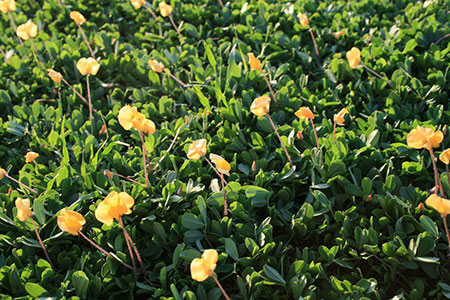Perennial Peanut
This low-maintenance groundcover offers bright flowers all summer long.

Characteristics
Florida’s hot summers and sandy soils can pose a challenge for some plants, but not this tough plant. Perennial peanut is a versatile groundcover that can be planted statewide and blooms all summer long with cheerful golden flowers.
It can be planted on its own as a groundcover in larger beds or used as a lawn alternative in areas that receive low levels of foot traffic. It also can be inter-planted within some existing lawns.
This spreading groundcover is particularly effective on sites that have problems with erosion, since the rhizomes grow to form a mat that helps hold soil in place.
Perennial peanut is evergreen in frost-free areas of the state. In colder parts of the state, it will drop its leaves, exposing its brown rhizomes. If you’re using perennial peanut as a lawn substitute, you can overseed the area with ryegrass to keep the area looking green throughout the winter.
Some of the best features of perennial peanut are its resistance to nematodes, pathogens, and drought. Plus it requires little fertilizer.
Planting and Care
Taller varieties of perennial peanut have traditionally been used as a forage crop, but shorter selections are now being grown for use in the landscape. The ornamental varieties are becoming more widely available, but you may need to call around to find a nursery that carries them.
You can establish perennial peanut any time of year using rhizomes, plugs, or containerized plants, as long as you provide regular irrigation during the establishment phase. Spacing them 12 to 18 inches apart will allow them to fill in the space completely.
Perennial peanut will flower best when planted in full sun, but it can also be planted in partial shade. Mowing established plants will make them bloom more, but it’s not required.
If you expect high levels of foot traffic where you’re planting your perennial peanut, be sure to provide stepping stones or create a plan for some other sidewalk material.
Because the rhizomes are fairly vigorous, it’s also a good idea to use metal or fiberglass edging along landscape beds to prevent perennial peanut from jumping into areas where you don’t want it.
Once your plants are established, it’s also fairly easy to create new plants from cuttings, which means you can plant more perennial peanut in your own yard or choose to share this great plant with friends.
For more information on perennial peanut, contact your county Extension office.
